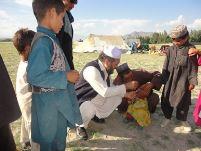 A child receiving a polio vaccine in Kandahar, Afghanistan
A child receiving a polio vaccine in Kandahar, Afghanistan
Two new polio cases detected in Afghanistan
Kabul 24 June 2014 – In collaboration with partners, WHO is supporting the Ministry of Public Health in immunizing 3.5 million children against polio in 13 provinces this week during subnational immunization days in the south, east, southeast and western regions of Afghanistan.
“Subnational immunization days are huge operations, at the moment we have 58 000 health workers and volunteers working in the field,” says Laurance Chabirand, Deputy Team Leader for Polio at WHO country office Afghanistan. “This is a great opportunity for Afghan families to get their children vaccinated against polio.”
This month two new polio cases, both two-year-old girls, have been detected in Afghanistan in Uruzgan and Nangarhar provinces. Epidemiological investigation of the cases, analysis of immunization gaps, review of acute flaccid paralysis (AFP) surveillance and active case search is currently under way. WHO and partners will also launch additional case response vaccination rounds in selected districts in response to these recently detected cases.
There are currently six polio cases in the country, five from the eastern region and one from the southern region. The majority of cases are reported from conflict-affected areas. During 2013, Afghanistan reported 14 confirmed polio cases, representing a 62% reduction from 2012. In addition to Pakistan and Nigeria, Afghanistan is one of the three remaining polio-endemic countries in the world.
While this week’s vaccination campaign has overall been successful, some challenges remain. Vaccinations were planned in Helmand but due to inaccessibility created by insecurity, vaccinators were not able to reach the area and 650 000 children did not receive vaccines. This will continue to pose a risk to poliovirus circulation in the south. Although there has been progress in the eastern region, five districts of Kunar province have been continuously inaccessible due to insecurity, leading to 12 000 children being unreached by vaccinators during each campaign.
Four subnational immunization days are organized annually, each round reaching around 3.5 million children. During four yearly national immunization days, next one scheduled for August 2014, WHO and its partners vaccinate around 9 million children under five against polio through a house-to-house approach. WHO is also supporting the implementation of polio case response activities, nomads campaigns, cross-border vaccination activities, as well as permanent vaccination teams in order to reach children in hard-to-access areas. There are 578 focal points and over 16 000 community-based reporting volunteers currently working all over the country to rid Afghanistan of polio.
“Polio is one of the key health challenges in Afghanistan and the Polio Eradication Initiative has generated many positive results. WHO is committed to tackling the spread of polio in the country and is working together with partners to detect cases, expand the immunization coverage and ensure we reach the target of a polio-free Afghanistan by the end of this year,” says WHO Representativein Afghanistan Dr Rik Peeperkorn.








